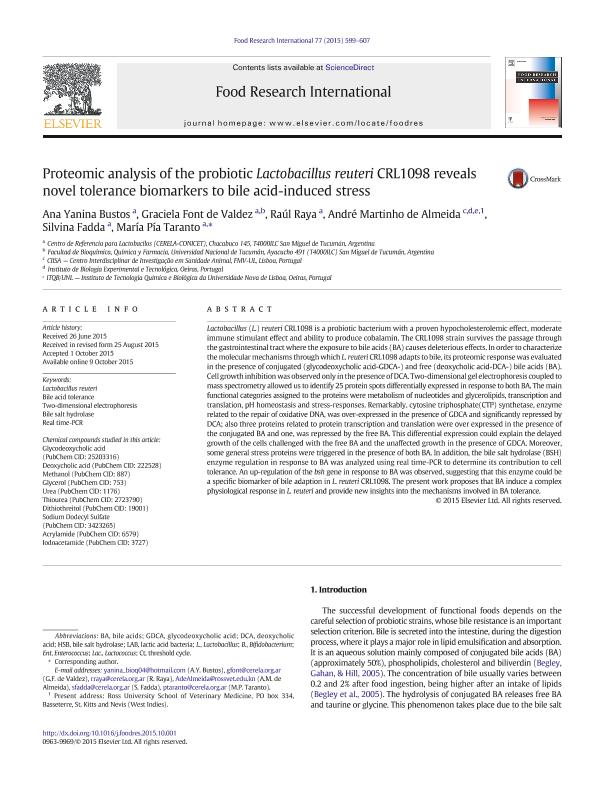Mostrar el registro sencillo del ítem
dc.contributor.author
Bustos, Ana Yanina

dc.contributor.author
Font, Graciela Maria

dc.contributor.author
Raya, Raul Ricardo

dc.contributor.author
de Almeida, André Martinho
dc.contributor.author
Fadda, Silvina G.

dc.contributor.author
Taranto, Maria Pia

dc.date.available
2017-11-17T17:58:43Z
dc.date.issued
2015-10-09
dc.identifier.citation
Bustos, Ana Yanina; Font, Graciela Maria; Raya, Raul Ricardo; de Almeida, André Martinho; Fadda, Silvina G.; et al.; Proteomic analysis of the probiotic Lactobacillus reuteri CRL 1098 reveals novel tolerance biomarkers to bile acid-induced stress; Elsevier Science; Food Research International; 77; 3; 9-10-2015; 599-607
dc.identifier.issn
0963-9969
dc.identifier.uri
http://hdl.handle.net/11336/28459
dc.description.abstract
Lactobacillus (L.) reuteri CRL1098 is a probiotic bacterium with a proven hypocholesterolemic effect, moderateimmune stimulant effect and ability to produce cobalamin. The CRL1098 strain survives the passage throughthe gastrointestinal tract where the exposure to bile acids (BA) causes deleterious effects. In order to characterizethe molecular mechanisms through which L. reuteri CRL1098 adapts to bile, its proteomic response was evaluatedin the presence of conjugated (glycodeoxycholic acid-GDCA-) and free (deoxycholic acid-DCA-) bile acids (BA).Cell growth inhibition was observed only in the presence of DCA. Two-dimensional gel electrophoresis coupled tomass spectrometry allowed us to identify 25 protein spots differentially expressed in response to both BA. The mainfunctional categories assigned to the proteins were metabolism of nucleotides and glycerolipids, transcription andtranslation, pH homeostasis and stress-responses. Remarkably, cytosine triphosphate(CTP) synthetase, enzymerelated to the repair of oxidative DNA, was over-expressed in the presence of GDCA and significantly repressed byDCA; also three proteins related to protein transcription and translation were over expressed in the presence ofthe conjugated BA and one, was repressed by the free BA. This differential expression could explain the delayedgrowth of the cells challenged with the free BA and the unaffected growth in the presence of GDCA. Moreover,some general stress proteins were triggered in the presence of both BA. In addition, the bile salt hydrolase (BSH)enzyme regulation in response to BA was analyzed using real time-PCR to determine its contribution to cell tolerance. An up-regulation of the bsh gene in response to BA was observed, suggesting that this enzyme could be a specific biomarker of bile adaption in L. reuteri CRL1098. The present work proposes that BA induce a complexphysiological response in L. reuteri and provide new insights into the mechanisms involved in BA tolerance.
dc.format
application/pdf
dc.language.iso
eng
dc.publisher
Elsevier Science

dc.rights
info:eu-repo/semantics/openAccess
dc.rights.uri
https://creativecommons.org/licenses/by-nc-sa/2.5/ar/
dc.subject
Lactobacillus Reuteri
dc.subject
Bile Acid Tolerance
dc.subject
Two-Dimensional Electrophoresis
dc.subject
Bile Salt Hydrolase
dc.subject
Real Time-Pcr
dc.subject.classification
Otras Ciencias Biológicas

dc.subject.classification
Ciencias Biológicas

dc.subject.classification
CIENCIAS NATURALES Y EXACTAS

dc.title
Proteomic analysis of the probiotic Lactobacillus reuteri CRL 1098 reveals novel tolerance biomarkers to bile acid-induced stress
dc.type
info:eu-repo/semantics/article
dc.type
info:ar-repo/semantics/artículo
dc.type
info:eu-repo/semantics/publishedVersion
dc.date.updated
2017-07-17T13:49:47Z
dc.identifier.eissn
1873-7145
dc.journal.volume
77
dc.journal.number
3
dc.journal.pagination
599-607
dc.journal.pais
Países Bajos

dc.journal.ciudad
Amsterdam
dc.description.fil
Fil: Bustos, Ana Yanina. Consejo Nacional de Investigaciones Científicas y Técnicas. Centro Científico Tecnológico Conicet - Tucuman. Centro de Referencia Para Lactobacilos; Argentina
dc.description.fil
Fil: Font, Graciela Maria. Consejo Nacional de Investigaciones Científicas y Técnicas. Centro Científico Tecnológico Conicet - Tucuman. Centro de Referencia Para Lactobacilos; Argentina. Universidad Nacional de Tucumán. Facultad de Bioquímica, Química y Farmacia; Argentina
dc.description.fil
Fil: Raya, Raul Ricardo. Consejo Nacional de Investigaciones Científicas y Técnicas. Centro Científico Tecnológico Conicet - Tucuman. Centro de Referencia Para Lactobacilos; Argentina
dc.description.fil
Fil: de Almeida, André Martinho. Centro Interdisciplinar de Investigação Em Sanidade Ani; Portugal. Universidade Nova de Lisboa. Instituto de Tecnologia Quimica e Biológica; Portugal. Instituto de Biologia Experimental e Tecnológica; Portugal
dc.description.fil
Fil: Fadda, Silvina G.. Consejo Nacional de Investigaciones Científicas y Técnicas. Centro Científico Tecnológico Conicet - Tucuman. Centro de Referencia Para Lactobacilos; Argentina
dc.description.fil
Fil: Taranto, Maria Pia. Consejo Nacional de Investigaciones Científicas y Técnicas. Centro Científico Tecnológico Conicet - Tucuman. Centro de Referencia Para Lactobacilos; Argentina
dc.journal.title
Food Research International

dc.relation.alternativeid
info:eu-repo/semantics/altIdentifier/url/http://www.sciencedirect.com/science/article/pii/S0963996915302118
dc.relation.alternativeid
info:eu-repo/semantics/altIdentifier/doi/http://dx.doi.org/10.1016/j.foodres.2015.10.001
Archivos asociados
